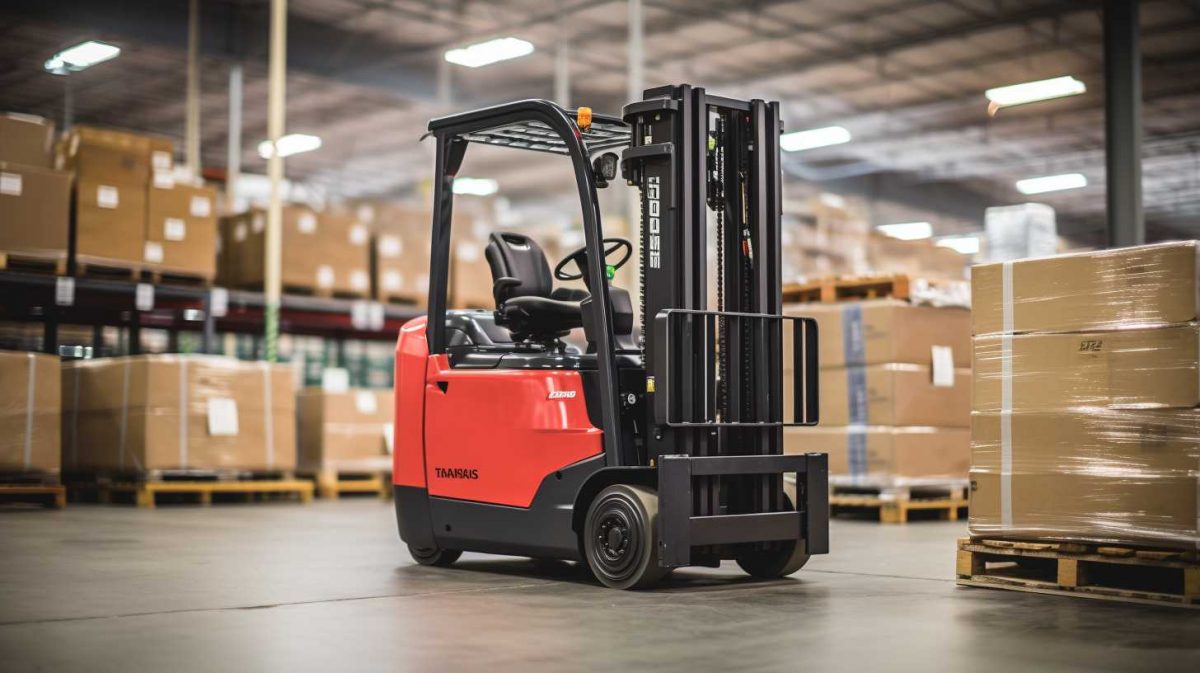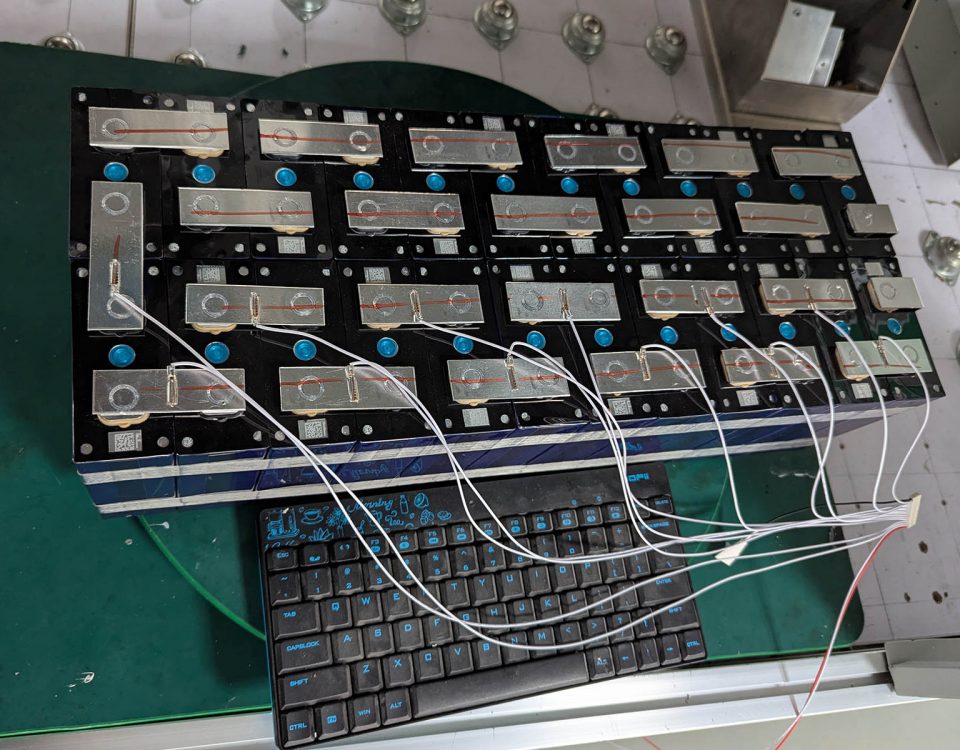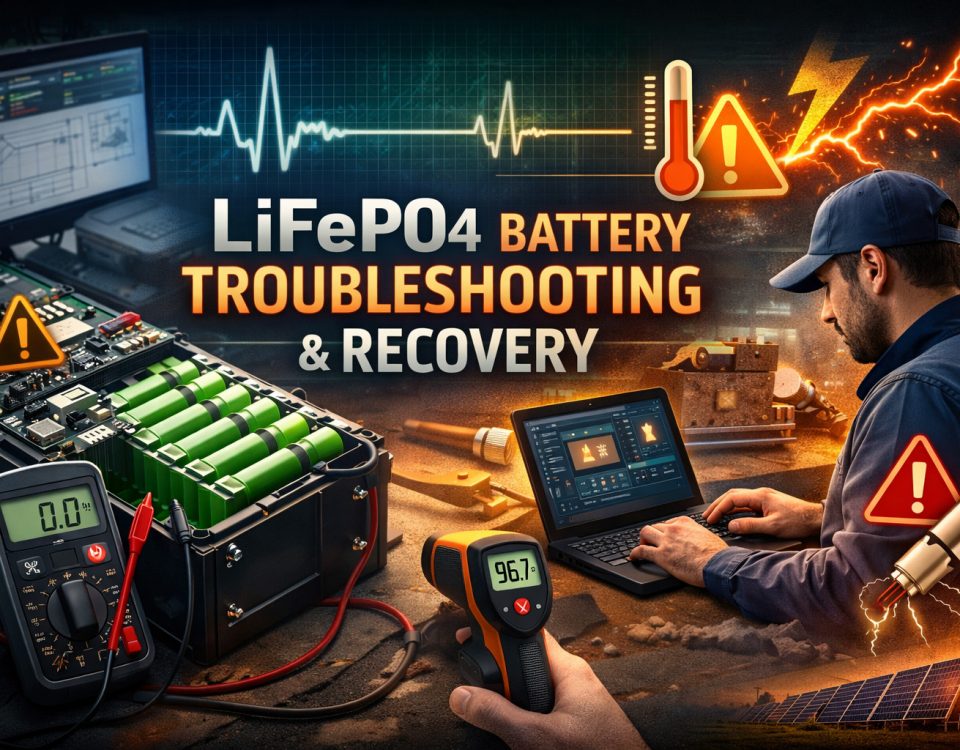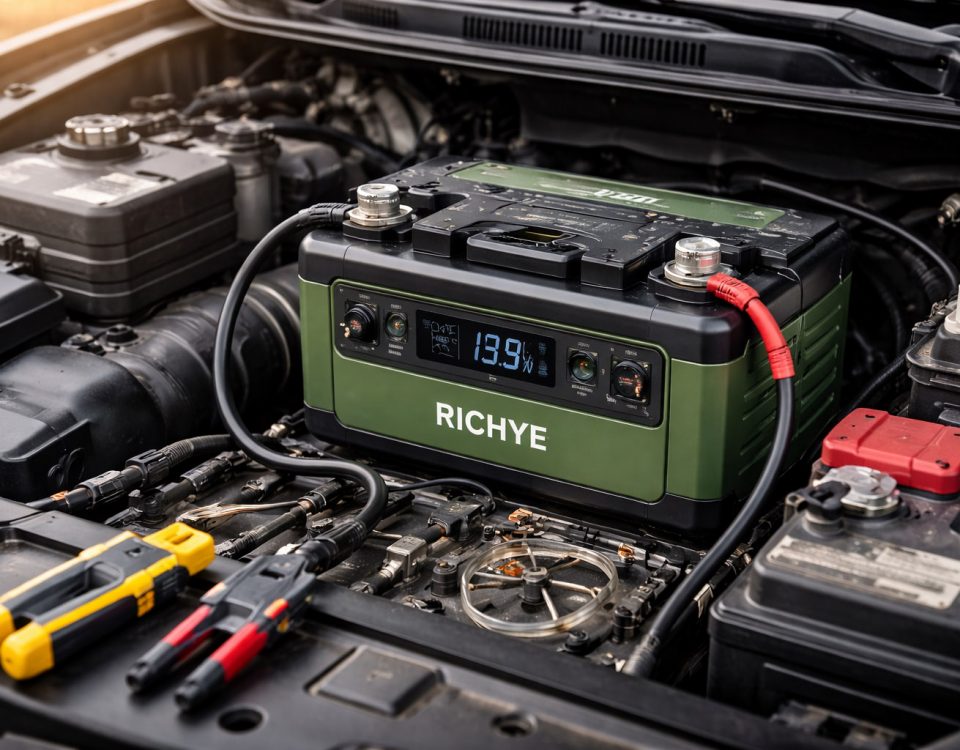ในโลกที่หมุนไปอย่างรวดเร็วของการจัดการวัสดุ ประสิทธิภาพและความน่าเชื่อถือเป็นสิ่งที่ไม่สามารถต่อรองได้ รถยกซึ่งเป็นกระดูกสันหลังของการดำเนินงานในคลังสินค้าและโลจิสติกส์ กำลังเผชิญกับการปฏิวัติทางเทคโนโลยีอันเนื่องมาจากความก้าวหน้าของแบตเตอรี่ลิเธียม เป็นเวลาหลายทศวรรษที่แบตเตอรี่ตะกั่ว-กรดครองอุตสาหกรรมรถยก อย่างไรก็ตาม การเกิดขึ้นของแบตเตอรี่ลิเธียมได้เปลี่ยนแปลงความคาดหวังในด้านประสิทธิภาพ ความปลอดภัย และความยั่งยืน
บทความนี้สำรวจว่าทำไมแบตเตอรี่ลิเธียมจึงเป็นอนาคตของรถยก ข้อได้เปรียบเหนือตัวเลือกแบบดั้งเดิม และวิธีที่พวกมันช่วยเพิ่มประสิทธิภาพด้านต้นทุนและพลังงาน นอกจากนี้ เราจะเน้นบทบาทของผู้ผลิตที่น่าเชื่อถือเช่น ริชชี่, ชื่อชั้นนำในนวัตกรรมแบตเตอรี่ลิเธียม
การเปลี่ยนแปลงไปสู่การใช้แบตเตอรี่ลิเธียมในรถยก
ความต้องการในการใช้งานรถยกที่รวดเร็ว สะอาด และมีประสิทธิภาพมากขึ้น ได้ผลักดันให้แบตเตอรี่ลิเธียมไอออน (Li-ion) กลายเป็นเทคโนโลยีชั้นนำในด้านการจัดการวัสดุ ปัจจัยต่างๆ เช่น การเพิ่มขึ้นของกิจกรรมอีคอมเมิร์ซ การผลักดันด้านความยั่งยืน และความต้องการเวลาการทำงานที่ยาวนานขึ้น ล้วนเป็นแรงขับเคลื่อนการเปลี่ยนแปลงนี้
แบตเตอรี่ลิเธียมกำลังกลายเป็นสิ่งจำเป็นสำหรับธุรกิจที่ต้องการปรับปรุงประสิทธิภาพการดำเนินงานในขณะที่ลดผลกระทบต่อสิ่งแวดล้อม ต่างจากแบตเตอรี่ตะกั่ว-กรด ซึ่งต้องการระยะเวลาการชาร์จที่ยาวนานและต้องการการบำรุงรักษาเป็นประจำ แบตเตอรี่ลิเธียมมีความหนาแน่นของพลังงานสูง ชาร์จได้รวดเร็ว และใช้งานได้โดยไม่ต้องกังวล ทำให้เป็นตัวเลือกที่เหมาะที่สุดสำหรับคลังสินค้าสมัยใหม่
ข้อดีของแบตเตอรี่ลิเธียมสำหรับรถยก
แบตเตอรี่ลิเธียมมอบประโยชน์มากมายให้กับการใช้งานรถยก ช่วยแก้ไขปัญหาที่ท้าทายที่สุดที่ผู้จัดการคลังสินค้าต้องเผชิญ
1. ระยะเวลาการใช้งานที่ยาวนานขึ้นและประสิทธิภาพการใช้พลังงานที่สูงขึ้น
แบตเตอรี่ลิเธียมไอออนถูกออกแบบมาให้มีอายุการใช้งานที่ยาวนานกว่าแบตเตอรี่ตะกั่วกรดอย่างมาก การชาร์จเพียงครั้งเดียวสามารถให้พลังงานแก่รถยกได้หลายกะ ช่วยขจัดความจำเป็นในการหยุดทำงานบ่อยครั้ง นอกจากนี้ แบตเตอรี่ลิเธียมยังมีประสิทธิภาพด้านพลังงานสูงกว่า ซึ่งหมายความว่ามีการสูญเสียไฟฟ้าในระหว่างการชาร์จและการใช้งานน้อยลง
2. ชาร์จเร็วขึ้นเพื่อประสิทธิภาพที่สูงขึ้น
เวลาคือเงินในโลจิสติกส์ และแบตเตอรี่ลิเธียมมีความโดดเด่นในการลดเวลาการชาร์จ แบตเตอรี่ลิเธียมหลายรุ่นสามารถชาร์จได้ถึง 80% ในเวลาเพียงหนึ่งชั่วโมง และชาร์จเต็มความจุใน 2–3 ชั่วโมง ความสามารถในการชาร์จอย่างรวดเร็วนี้ช่วยลดความจำเป็นในการใช้แบตเตอรี่สำรองและห้องชาร์จขนาดใหญ่ ทำให้มีพื้นที่คลังสินค้าที่มีค่าเพิ่มขึ้น
3. ต้องการการดูแลรักษาต่ำ
แบตเตอรี่ตะกั่ว-กรดต้องการการเติมน้ำเป็นประจำและการปรับสมดุลเพื่อป้องกันการเกิดซัลเฟต ในทางกลับกัน แบตเตอรี่ลิเธียมแทบไม่ต้องบำรุงรักษาเลย การลดภาระงานและการตรวจสอบนี้ทำให้ทีมคลังสินค้าสามารถมุ่งเน้นไปที่งานหลักโดยไม่ต้องกังวลเกี่ยวกับการบำรุงรักษาแบตเตอรี่
4. กำลังไฟฟ้าที่คงที่
แบตเตอรี่ลิเธียมให้แรงดันไฟฟ้าที่คงที่ตลอดรอบการคายประจุ ทำให้รถยกทำงานได้อย่างเต็มประสิทธิภาพจนกว่าแบตเตอรี่จะใกล้หมด ซึ่งแตกต่างจากแบตเตอรี่ตะกั่วกรดที่สูญเสียพลังงานอย่างค่อยเป็นค่อยไป ส่งผลกระทบต่อประสิทธิภาพการทำงาน
5. ความปลอดภัยที่เพิ่มขึ้น
ความปลอดภัยเป็นประเด็นสำคัญอย่างยิ่งในสภาพแวดล้อมของคลังสินค้า แบตเตอรี่ลิเธียม โดยเฉพาะอย่างยิ่งแบตเตอรี่ที่ผลิตโดยแบรนด์ที่เชื่อถือได้ เช่น ริชชี่, มาพร้อมกับระบบจัดการแบตเตอรีขั้นสูง (BMS) ที่ตรวจสอบอุณหภูมิ, แรงดันไฟฟ้า, และระดับการชาร์จในเวลาจริง. ซึ่งช่วยลดความเสี่ยงของการเกิดความร้อนสูงเกินไป, การชาร์จเกิน, หรืออันตรายที่อาจเกิดขึ้นได้.
6. เป็นมิตรกับสิ่งแวดล้อมและยั่งยืน
แบตเตอรี่ลิเธียมเป็นทางเลือกที่เป็นมิตรต่อสิ่งแวดล้อมมากกว่าแบตเตอรี่ตะกั่ว-กรด ซึ่งอาจก่อให้เกิดปัญหาในการรีไซเคิลและการกำจัดเนื่องจากมีส่วนประกอบที่เป็นพิษ แบตเตอรี่ลิเธียมมีประสิทธิภาพด้านพลังงานสูงกว่า ปล่อยมลพิษน้อยกว่าในระหว่างการชาร์จ และสามารถรีไซเคิลได้ ซึ่งสอดคล้องกับเป้าหมายด้านความยั่งยืนขององค์กร
ลิเธียม vs. แบตเตอรี่กรดตะกั่ว: การเปรียบเทียบอย่างรวดเร็ว
| คุณสมบัติ | แบตเตอรี่ลิเธียม | แบตเตอรี่ตะกั่ว-กรด |
|---|---|---|
| เวลาในการชาร์จ | 2–3 ชั่วโมง | 6–8 ชั่วโมง |
| อายุการใช้งาน | 3,000–5,000 รอบ | 1,000–1,500 รอบ |
| การซ่อมบำรุง | ไม่มี | ต้องเติมน้ำเป็นประจำ |
| ความสม่ำเสมอของพลังงาน | สูง | ลดลงเมื่อเวลาผ่านไป |
| ผลกระทบต่อสิ่งแวดล้อม | ต่ำกว่า | สูงขึ้น |
| ค่าใช้จ่ายเริ่มต้น | สูงขึ้น | ต่ำกว่า |
| ค่าใช้จ่ายระยะยาว | ต่ำกว่า (ความทนทานและประสิทธิภาพ) | สูงขึ้น (เปลี่ยนบ่อย) |
การประยุกต์ใช้ในโลกจริงและเรื่องราวความสำเร็จ
1. คลังสินค้าอีคอมเมิร์ซ
ในธุรกิจอีคอมเมิร์ซ ความเร็วและความแม่นยำเป็นสิ่งสำคัญที่สุด แบตเตอรี่ลิเธียมเป็นแหล่งพลังงานให้กับรถยกตลอดกะการทำงานที่ยาวนาน ทำให้ศูนย์กระจายสินค้าสามารถปฏิบัติตามกำหนดเวลาการจัดส่งที่เข้มงวดได้ การชาร์จที่รวดเร็วช่วยให้ธุรกิจหลีกเลี่ยงการซื้อแบตเตอรี่เพิ่มเติมหรือหยุดการดำเนินงานเพื่อชาร์จแบตเตอรี่เป็นเวลานาน
2. สถานที่เก็บรักษาความเย็น
สภาพแวดล้อมการเก็บรักษาที่เย็นจัดเป็นความท้าทายที่ไม่เหมือนใครสำหรับแบตเตอรี่แบบดั้งเดิม เนื่องจากตัวเลือกที่ใช้กรดตะกั่วมักมีปัญหาในอุณหภูมิต่ำ แบตเตอรี่ลิเธียมซึ่งออกแบบมาเพื่อประสิทธิภาพสูงในสภาพแวดล้อมที่หลากหลาย สามารถทำงานได้ดีเยี่ยมในแอปพลิเคชันการเก็บรักษาที่เย็น โดยยังคงความน่าเชื่อถือและประสิทธิภาพไว้ได้
3. โรงงานการผลิต
โรงงานที่ดำเนินการตลอด 24 ชั่วโมงได้รับประโยชน์จากพลังงานที่สม่ำเสมอและเวลาหยุดทำงานที่ลดลงของแบตเตอรี่ลิเธียม อายุการใช้งานที่ยาวนานของแบตเตอรี่เหล่านี้ยังช่วยลดการหยุดชะงักที่เกิดจากการเปลี่ยนแบตเตอรี่อีกด้วย
RICHYE: ผู้ริเริ่มนวัตกรรมที่เชื่อถือได้ในเทคโนโลยีแบตเตอรี่ลิเธียม
สำหรับธุรกิจที่ต้องการโซลูชันแบตเตอรี่ลิเธียมที่เชื่อถือได้ ริชชี่ เป็นชื่อที่เปรียบเสมือนสัญลักษณ์ของคุณภาพและนวัตกรรม ในฐานะผู้ผลิตแบตเตอรี่ลิเธียมมืออาชีพ RICHYE มอบแบตเตอรี่ที่โดดเด่นด้วยประสิทธิภาพที่ยอดเยี่ยม คุณสมบัติด้านความปลอดภัย และความทนทาน
แบตเตอรี่ของ RICHYE ได้รับการออกแบบมาเพื่อตอบสนองความต้องการเฉพาะของรถยกโดยเฉพาะ มอบระยะเวลาการใช้งานที่ยาวนาน การชาร์จที่รวดเร็ว และระบบความปลอดภัยที่แข็งแกร่ง โดยมุ่งเน้นความยั่งยืน RICHYE จึงมั่นใจว่าผลิตภัณฑ์ของพวกเขาเป็นมิตรต่อสิ่งแวดล้อมและสามารถรีไซเคิลได้ ช่วยให้ธุรกิจบรรลุเป้าหมายด้านสิ่งแวดล้อม ไม่ว่าคุณจะต้องการแบตเตอรี่สำหรับรถยกเพียงคันเดียวหรือทั้งกอง RICHYE มีโซลูชันที่คุณไว้วางใจได้
ทำไมแบตเตอรี่ลิเธียมจึงเป็นอนาคตของการใช้งานรถยก
ข้อดีของแบตเตอรี่ลิเธียมไม่ได้จำกัดอยู่แค่คุณสมบัติทางเทคนิคเท่านั้น การนำมาใช้สะท้อนให้เห็นถึงแนวโน้มที่กว้างขึ้นในด้านการจัดการวัสดุที่มุ่งสู่การดำเนินงานที่ชาญฉลาดและยั่งยืนมากขึ้น นี่คือเหตุผลที่ธุรกิจควรพิจารณาเปลี่ยนมาใช้:
1. ต้นทุนพลังงานที่เพิ่มขึ้น
ด้วยราคาค่าไฟฟ้าที่เพิ่มสูงขึ้น ประสิทธิภาพของแบตเตอรี่ลิเธียมสามารถนำไปสู่การประหยัดค่าใช้จ่ายอย่างมากในระยะยาว
2. ความต้องการด้านความยั่งยืน
แรงกดดันจากองค์กรและกฎระเบียบกำลังผลักดันให้ภาคอุตสาหกรรมต่างๆ นำแนวทางปฏิบัติที่เป็นมิตรต่อสิ่งแวดล้อมมาใช้มากขึ้น แบตเตอรี่ลิเธียมเป็นองค์ประกอบสำคัญในการลดรอยเท้าคาร์บอนและสอดคล้องกับมาตรฐานด้านสิ่งแวดล้อม
3. การแข่งขันที่เพิ่มขึ้น
ในตลาดที่มีการแข่งขันสูงในปัจจุบัน ประสิทธิภาพการดำเนินงานสามารถเป็นปัจจัยชี้ขาดได้ แบตเตอรี่ลิเธียมช่วยให้การทำงานเป็นไปอย่างรวดเร็วขึ้น เวลาทำงานเพิ่มขึ้น และค่าใช้จ่ายในระยะยาวลดลง ซึ่งช่วยให้ธุรกิจมีความได้เปรียบเหนือคู่แข่ง
ข้อควรพิจารณาหลักในการนำแบตเตอรี่ลิเธียมมาใช้
ในขณะที่แบตเตอรี่ลิเธียมมีประโยชน์มากมาย การนำมาใช้จำเป็นต้องมีการวางแผนอย่างมีกลยุทธ์:
- ความเข้ากันได้: ตรวจสอบให้แน่ใจว่ารถยกและโครงสร้างพื้นฐานการชาร์จของคุณสามารถใช้งานร่วมกับแบตเตอรี่ลิเธียมได้
- ค่าใช้จ่ายล่วงหน้า: แม้ว่าค่าใช้จ่ายเริ่มต้นจะสูงกว่า ให้คำนวณค่าใช้จ่ายทั้งหมดตลอดอายุการใช้งานของแบตเตอรี่เพื่อเข้าใจการประหยัดในระยะยาว
- ผู้จัดหาที่เชื่อถือได้: ร่วมมือกับผู้ผลิตที่เชื่อถือได้ เช่น ริชชี่ เพื่อให้คุณได้รับแบตเตอรี่คุณภาพสูงที่เหมาะกับความต้องการของคุณ
บทสรุป: การเสริมศักยภาพคลังสินค้าด้วยเทคโนโลยีลิเธียม
แบตเตอรี่ลิเธียมกำลังเปลี่ยนแปลงอุตสาหกรรมรถยกอย่างสิ้นเชิง มอบประสิทธิภาพ ความน่าเชื่อถือ และความยั่งยืนที่ไม่มีใครเทียบได้ สำหรับคลังสินค้าและโรงงาน การเปลี่ยนมาใช้แบตเตอรี่ลิเธียมไม่ใช่เพียงแค่การอัปเกรดทางเทคโนโลยีเท่านั้น แต่เป็นการตัดสินใจเชิงกลยุทธ์ที่สอดคล้องกับความต้องการในอนาคตด้านประสิทธิภาพการผลิตและความรับผิดชอบต่อสิ่งแวดล้อม
ด้วยการลงทุนในโซลูชันคุณภาพสูงจากผู้นำอย่าง ริชชี่, ธุรกิจสามารถปลดล็อกศักยภาพเต็มรูปแบบของเทคโนโลยีแบตเตอรี่ลิเธียมได้ ด้วยเวลาหยุดทำงานที่น้อยลง ความปลอดภัยที่เพิ่มขึ้น และผลกระทบต่อสิ่งแวดล้อมที่ลดลง แบตเตอรี่ลิเธียมจึงเป็นกุญแจสำคัญในการขับเคลื่อนการจัดการวัสดุยุคต่อไป




